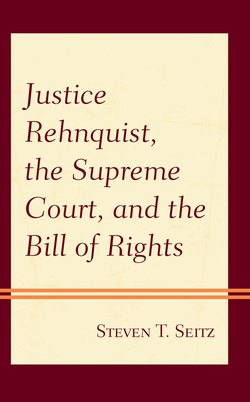Читать книгу Justice Rehnquist, the Supreme Court, and the Bill of Rights - Steven T. Seitz - Страница 28
На сайте Литреса книга снята с продажи.
The Dreaded Decision
ОглавлениеTaney claimed that when a writ of error brings forth the transcript of proceedings in a lower court, then the entire record is open to inspection and revision. This claim set the stage to wander far beyond the question brought forth by the writ of error. Scott won in the county court but lost in the Missouri Supreme Court. Parties in the lower federal court, in abatement, accepted the court’s jurisdiction. The defendant claimed in abatement to the court that Scott was not a citizen of Missouri because of his African descent. Both plaintiff and defendant demurred to the abatement plea. That court overruled the abatement and held hearings where the court decided the issue in Sanford’s favor. The court gave to the jury instructions unfavorable to Scott, and on these points, Scott filed the writ of error. Meanwhile, the Missouri Supreme Court had remanded the state case back to the lower state court, which continued the case until SCOTUS rendered its opinion.
Taney now took an axe to established court procedures. He began with the claim that any judgments below that are not in the writ of error are still open to inspection, even if the plaintiff bringing the writ got the favorable decision. He began with the two basic questions: did the circuit court have jurisdiction? If so, was its judgment erroneous? Scott pressed a diversity suit, with he and family citizens of Missouri and Sanford a citizen of New York. Taney used what at first appeared a counterfactual: if the jurisdiction is legally before the court, then the Constitution disqualifies Scott for citizenship. The circuit court is wrong, and its decision reversed. The plaintiff did not bring this question before SCOTUS and the defendant waived this defense below. Taney set the stage to convert the counterfactual into a finding by pointing out there are different rules for pleading jurisdiction in the federal courts than in those using English common law. The state courts of general jurisdiction assumedly have jurisdiction unless contraindicated. Such jurisdictional procedures in the state courts will not have influence in SCOTUS. It is incumbent on the plaintiff to show the pleading comes within the enumerated authorization of the federal court. If the plaintiff fails to do this but gets approval of the circuit court, the appellate court would reverse it. A diversity suit between citizens of different states requires an averment of citizenship for the plaintiff and defendant, respectively.
Taney then examined how the lower court established citizenship. The lower court accepted a plea in abatement, but the opposite is in the demurrer agreed by both parties. These issues were part of the circuit court record, and the writ of error brought the entire proceedings to the court. Taney reexamined the abatement plea. He argued:
The question is simply this: can a negro whose ancestors were imported into this country and sold as slaves become a member of the political community formed and brought into existence by the Constitution of the United States, and as such become entitled to all the rights, and privileges, and immunities, guarantied [sic] by that instrument to the citizen, one of which rights is the privilege of suing in a court of the United States in the cases specified in the Constitution?
The African descendants in this political community entered as slaves, and whether now emancipated or descendants of the emancipated, they can never be citizens by that term in the Constitution. Unlike Africans, the United States has always treated Indians as free; Congress may naturalize Amerindians and let them become citizens. Taney posits that “people of the United States” and “citizens” are synonymous. These are the sovereign people. Slaves or their descendants are not members of this class of people and the Constitution never intended such. These people are not eligible for rights or privileges afforded citizens; they are inferior and remain subjugated even if emancipated. Taney distinguishes citizenship in a state from citizenship in the United States. A state may give rights or privileges to a person of African descent, but that translates to nothing regarding US citizenship and its rights and privileges. Those of African descent cannot even sue in US courts. No state can endow federal citizenship. Scott cannot be a citizen of Missouri with correlative citizenship in the United States. No federal court can allow Scott to sue in that court. Slaves and their descendants are property.
